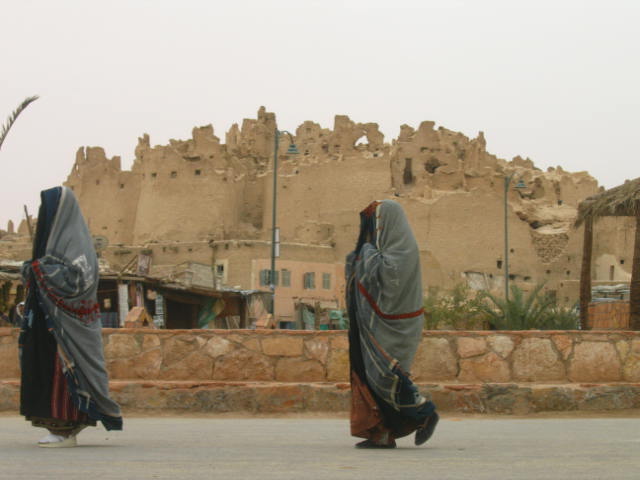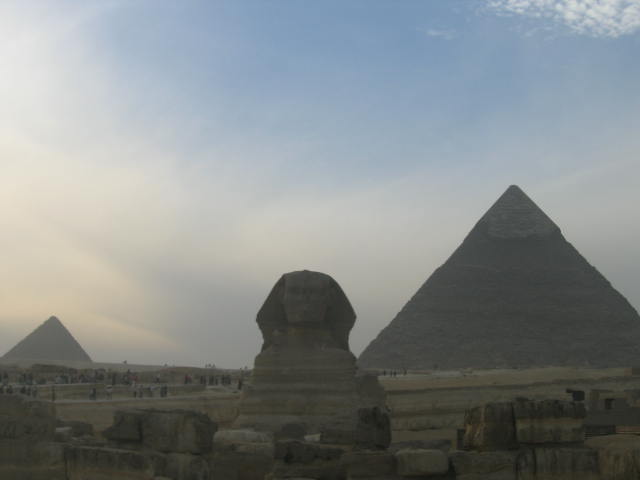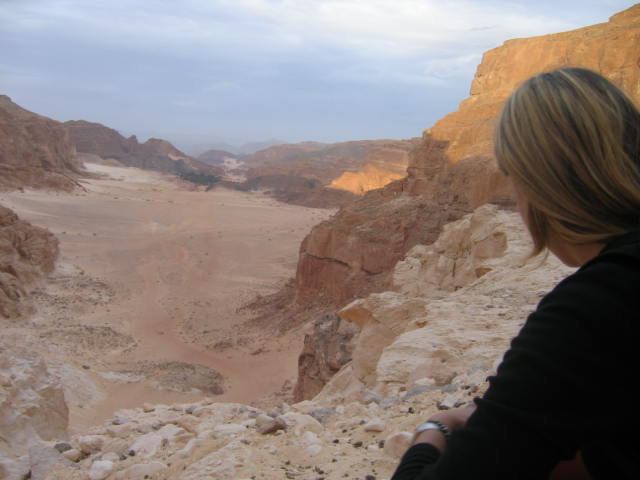
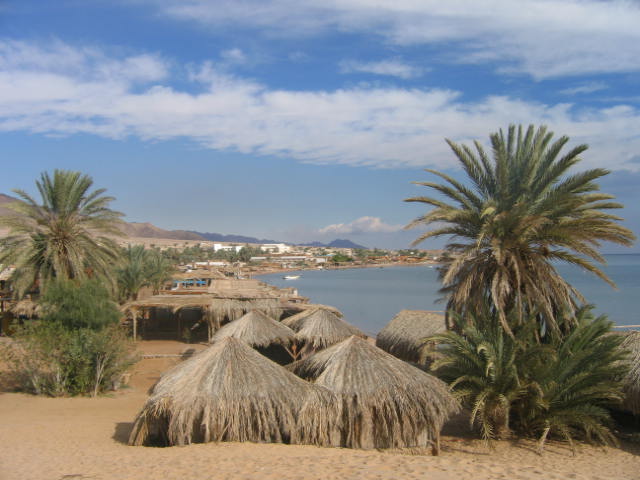
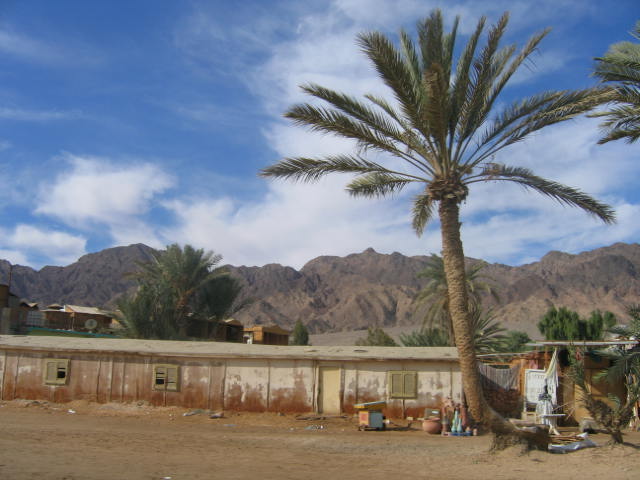
Photos: 1.typic Peugeot 504 taxi (this one was happy to take me for free). 2 and 3: Tarabin.
To visit the ruined city of Petra, in Jordan, I had used my favorite tactic, partially genuine, that of disgusing myself of serious man with a project among hisn hands. Folder under the arm, the glasses that I seldom use and a vocabulary more complicated than necessary helped me to avoid the painful U$S30 ticket. From Petra southwards, the soles of my shoes headed to Cairo. Now, it was not gonna be so easy to dash straight forward through a desert which God used to test his own prophets with temptations and dilemas. In this way, with the sharp cold night enveloping the desert I had to choose wether to sleep inside a truck whose driver hd fallen in love with me or the star clad roof. None of the 7 species of poisonous snakes (not even God) called in for some chat a while and make uo for the length of the night. In any case, the tax was more reasonable than moses one: wandering 40 years in the same desert…
In the Jordanian port of Aqaba I boarded a Sinai boud ferry. Off to Egypt through the Red Sea. All very well known geographic accidents, though rarely we have the chance of linking them with anything else that long since forgoten religion classes. The ferry dropped me in Nuweiba, on of many beach resorts that dot the Sinai coast. I the 5 kms that I walked until finding a lesss touristy spot I could spot, beside camel-riding kids, the dramatic date of the rocky desert and the crystal clear waters of the Red Sea, with its palm tres pinned beach. I had never thought that camels and colour fish could share the same ecosytem.
The quiet beach resort was named Tarabin. The other only foreigners there were a Japanese that had been cycling his way from the land of the Borning Sun, an iraqi nationalized British on his way to spend New Year’s Eve in Baghdad, and one of those German or French families (never American) the do their best to reproduce in their holidays the atmosphere of a Robinsoe Crusoe’s Tale. When I approached to talk, they turned out to be from the Saxon community in Cisnadioara, and my mind blend time back to the sunny days I had spent strolling in the Breite with my Hans and other local friends. December 24 arrived, on of the weirdest 24’s in my life, I spent it around a fire prepeared with a chopped palm tree, talking with the Iraqi guy and a Sudanese, who turned up to sahre with us his melancholic dreams of, some day migrating to the U.S…
On the 25th itself, instead, I decided I deserved some socializing, so I headed for Dahab, popular spot among the hippies in the 60s and 70s, now has just become a trendy beach resort, partly due to the diving industry boom. The Just do it spirit replaced the Let it be. In general, the travellers I met there, mainly Australian and Canadians, didn’t seem to be moved to travel but nothing else but having the finnancial possibility of doing it. At 12 o clock, sorrounded by half Commonwealth, everybody was talking about their proffesional lifes. Eventualy, I was my turn: So what do you do? In these scenarios I feel insanely tempted to declare myself manager of the Umbrella Producing Society of Ulan Bator. While truth would be: freelance lazy, proffesional world wanderer with PhD in roadside walking, proud owner of a 1 Euro account statement… and so on. Beter to go on with the mask of the student until the first whilte hair flowers. And some stopped talking to me. Serious people are irritated when they realized that some people around are just keen on developing nothingness with the vehemence of a conspirator.
On the 26 I wsa back on the road to Cairo, arranging free rides with money asking drivers. It is illegal to hitch hike in Egypt and checkpoints dot all roads. It seems one is arriving to a battle field. In each checkpoint, I smily proclaim that I am walking around the world and hand them my passport. When they read Argentina, conversation turns to Maradona’s health. They tell me to be ware, that snakes and some lawless beduins inhabit the desert, and finaly, after relocating one of the soldiers (machine gun included) in the trunk of the pick up, they give me a short ride themseklves. Night surprises me in the city of Tur, with one of the archs of the tent broken, problem fixed thanks to the tools provided by the local barber’s shop.
The first truck I flagged down on the 27th was going to Suez in one piece. The Suez Channel is sorted by a tunnel. The light glowing in the other side comes from a different continent: Africa. My staying in the continent will be brief and limit itself to Egypt. I made it to Cairo at sunset. With 18 millon souls and its streets shared by happy horn drivers, donkeys and bazaar vendors alike, the city is the most chaotic place I have ever seen. Like a heart, though, it never stops, and even 3 AM is a sitable time to go for a stroll and start bargaining in the street stolls selling anything from trousers to featherful caged chiken. In the hostel were I crush I realize that all travelers have been in the city for several weeks. Some study percusion with local musicians, others Arabic. All excuses to justify the unspecific magnetism that the city provides. Sticking glue under the nomad’s shoes. All stuck like whale in the low tide, victims of a mysterious attachment. A good example is Denny, the Canadian. Running short of money he started to find a way of exporting egyptian watermelons to Canada. In an identic situation an Argentinean would only stretch to perform as Living Statue in the streets… In another aspect I feel a bit ashamed for my fellow travellers who, busy with the Pyramids, they don’t see the current pharaons. President Mubarak has sent to prison a political opponent some time ago, and some timid manifestations happen on the Talat Harb Square. The police, in a psycologic move to display the manifestators as dangerous, were sent to cordon them off as they walked, like a living hand in hand membrana of authoritarism. When the Islamic explorer Ibn Batuta visited the city he penned: “ Cairo, mother of the cities and site of Pharao the tyran”. Not much has change in a country that cannot find its Timisoara.




